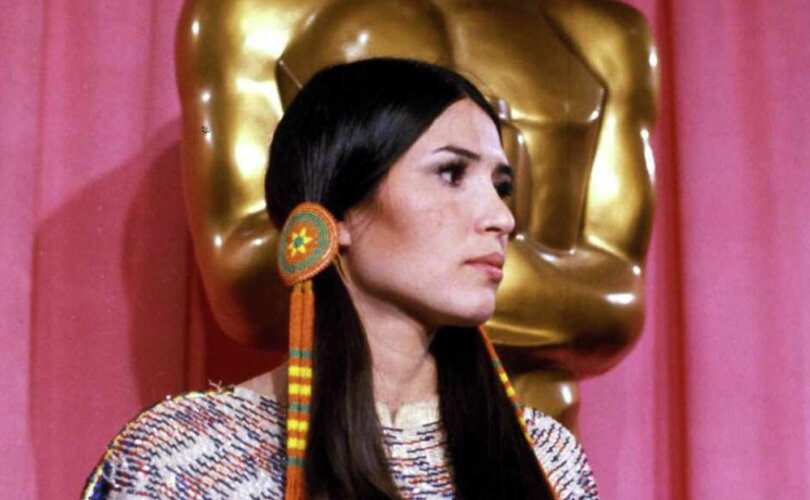(LifeSiteNews) – An Indigenous rights activist has been exposed after her recent death for lying to the world about her supposed Native American heritage.
The late Sacheen Littlefeather, best-known for rejecting Marlon Brando’s 1973 Academy Award on his behalf, has recently been outed by her family as an “ethnic fraud.”
The biological sisters of Littlefeather, whose real name was Marie Louise Cruz, exposed her indigenous identity as fraudulent in an interview with Jacqueline Keeler, a Native American writer and activist. Littlefeather’s biological sisters said that they identify primarily as “Spanish” and that Littlefeather had lied about her Indigenous roots.
“It is a fraud,” Littlefeather’s sister, Rosalind Cruz, told Keeler, for an opinion piece in The San Francisco Chronicler. “It’s disgusting to the heritage of the tribal people. And it’s just … insulting to my parents.”
Littlefeather’s other sister, Trudy Orlandi, also confirmed to Keeler that Littlefeather was making false claims when she said she was White Mountain Apache and Yaqui through her father.
“It’s a lie,” Orlandi said. “My father was who he was. His family came from Mexico. And my dad was born in Oxnard [California].”
Littlefeather’s sisters said that the activist thought identifying as Native American was more “prestigious” than acknowledging her Hispanic heritage.
“I mean, you’re not gonna be a Mexican American princess,” said Orlandi. “You’re gonna be an American Indian princess. It was more prestigious to be an American Indian than it was to be Hispanic in her mind.”
According to Keeler, both sisters also rejected claims made by Littlefeather throughout her life that she grew up in an abusive home with a violent, alcoholic father.
“My father’s father, George, he was the alcoholic,” Orlandi told Keeler. “My dad never drank. My dad never smoked. And you know, she also blasted him and said my father was mentally ill. My father was not mentally ill.”
Cruz confirmed that Littlefeather had lied about her childhood, saying that she had stolen the story of her father’s unhappy childhood and made it her own.
“My father was deaf, and he had lost his hearing at 9 years old through meningitis,” Cruz said. “He was born into poverty. His father, George Cruz, was an alcoholic who was violent and used to beat him. And he was passed to foster homes and family. But my sister Sacheen took what happened to him.”
Keeler said that whether or not Littlefeather truly had some Indigenous blood was not the issue at hand.
“Indigenous identity is more complicated than that,” she wrote. “A U.S. citizen of distant French descent does not get to claim French citizenship. And it would be absurd for that person to wear a beret on stage at the Oscars and speak on behalf of the nation of France. The White Mountain Apache is a very specific tribe with very specific rules of membership.”
“Falsely claiming its heritage, using it to become a spokesperson and relying on dangerous tropes about an abusive Indian father to bolster that fable did real damage,” she added.
Littlefeather was not the only white person to achieve status through lying about her racial identity. In 2015, Rachel Dolezal, a left-wing activist, college instructor, and president of her local chapter of the National Association for the Advancement of Colored People (NAACP), made headlines after it was revealed that she was a white woman masquerading as a black woman.
While Dolezal continued to identify as black, as quoted in an article by The Guardian, because “nothing about whiteness describes who I am,” other news outlets reported that Dolezal had previously been involved in a lawsuit in 2002 with Howard University, the historically black Washington D.C. university, which she accused of discriminating against her for being white.
In 2020 another white woman was caught identifying as a black woman. LGBT activist Satchuel Cole was, according to the Indianapolis Star, “a highly visible community leader advocating for racial and social justice in Indiana.” But she was also “a white person who pretended to be Black to increase her credibility in the progressive community,” wrote LifeSite’s Jonathon Van Maren. Van Maren noted that Cole had admitted, “in a weird apology,” that she had “taken up space as a Black person while knowing [she is] white.”
Cole continued her apologies on Facebook, where she said that she had “used Blackness when it was not mine to use” and that she had used her black identity to ask “for support and energy as a Black person.”
However, whatever the reasons may have been behind falsely identifying herself as a member of as another race, Littlefeather’s sister Trudy described her imposition as a “fantasy.”
“The best way that I could think of summing up my sister is that she created a fantasy,” Orlandi said. “She lived in a fantasy, and she died in a fantasy.”

